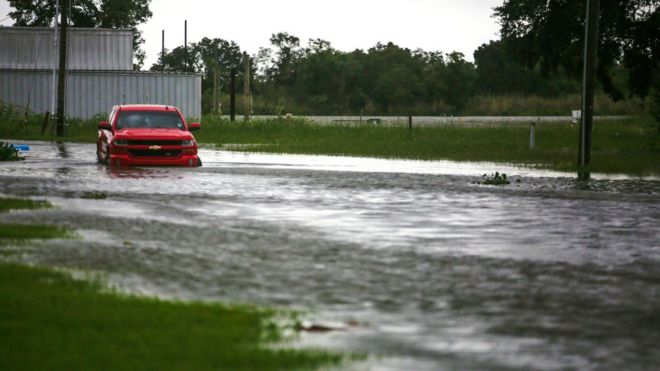Hurricane Laura has made landfall in the US state of Louisiana, causing flash flooding and leaving hundreds of thousands of homes without power.
Forecasters earlier warned that the storm, a category four when it struck the coast with winds of up to 150mph (240km/h), threatened to cause an "unsurvivable" storm surge.
Hurricane Laura is one of the strongest storms to ever hit the US Gulf Coast.
Half a million residents have been told to leave parts of Texas and Louisiana.
Hurricane Laura made landfall shortly after midnight local time (05:00 GMT) near the district of Cameron, in Louisiana. By 04:00, it had been downgraded to a category three storm, with winds of up to 130mph (208km/h), the National Weather Service (NWS) reported.
The storm has since been downgraded further, to category two, and is expected to continue weakening as it moves inland.
The NWS said that the "unsurvivable storm surge... could penetrate up to 40 miles inland from the immediate coastline, and flood waters will not fully recede for several days".
More than 390,000 homes in Louisiana reportedly lost power in the early hours on Thursday, according to the US tracking site PowerOutage. In Texas, more than 100,000 homes suffered power cuts.
The National Hurricane Center (NHC) earlier warned any residents remaining in or near the path of the "catastrophic" storm to "take action now to protect your life... in a reinforced interior room away from windows".
"Get under a table or other piece of sturdy furniture," the NHC said, adding: "Use mattresses, blankets or pillows to cover your head and body."
Television footage showed heavy rain and strong winds lashing the coastal city of Lake Charles in south-west Louisiana. Buildings have reportedly been damaged and trees ripped from the ground.
Laura and another storm, Marco, earlier swept across the Caribbean, killing 24 people. Marco struck Louisiana on Monday, bringing strong winds and heavy rain.
Initially it was feared that both storms would hit Louisiana as hurricanes within 48 hours of each other - an unprecedented event - but Marco was downgraded to a tropical storm.
While Laura strengthened rapidly on Wednesday from category three to category four, it weakened in the hours after reaching the Louisiana coast.
Hurricane Katrina - which devastated New Orleans in 2005, killing more than 1,800 people - was a category five storm before weakening to a category three when it made landfall in the US. Broken levees led to disastrous flooding in the city of New Orleans, which sits some 6ft (2m) below sea level, making it particularly vulnerable to storms.
US President Donald Trump told those potentially affected by the storm to "listen to local officials" as the storm was "very dangerous and rapidly intensifying".
Evacuations are complicated by the Covid-19 pandemic. Texas Governor Greg Abbott urged families who could afford it to take refuge in hotels and motels to be distanced from others.
What more can we expect from Hurricane Laura?
On Wednesday, the NHC said satellite images had shown that Laura had undergone a remarkable intensification to become a "formidable hurricane".
In a series of tweets, it said Laura was expected to bring "life-threatening hazards" to parts of the coast of the Gulf of Mexico.
Well-built homes could incur major damage, trees were likely to be snapped or uprooted and electricity and water would be unavailable for days or even weeks, it said.
"Hurricane force winds and widespread damaging wind gusts will also spread well inland into portions of eastern Texas and western Louisiana early Thursday," the NHC added.
Storm surges of more than 20ft (6m) are possible. "To think that there would be a wall of water over two storeys high coming on shore is very difficult for most to conceive, but that is what is going to happen," said NWS meteorologist Benjamin Schott.
"The word 'unsurvivable' is not one that we like to use, and it's one that I've never used before," he added.
Governor Abbott urged people in the path of the storm to "take advantage of these final few hours to evacuate".
"The power of Hurricane Laura is unprecedented, and Texans must take action now to get out of harm's way and protect themselves," he said.
More than 420,000 Texas residents have been ordered to leave, while an additional 200,000 were told to evacuate Calcasieu Parish in south-western Louisiana.
Port Arthur, Texas, is home to the nation's largest oil refinery, and workers have been taken off at least 310 offshore facilities in the Gulf of Mexico, reducing oil production by 84% for a second day in a row, officials said.
Source : BBC





